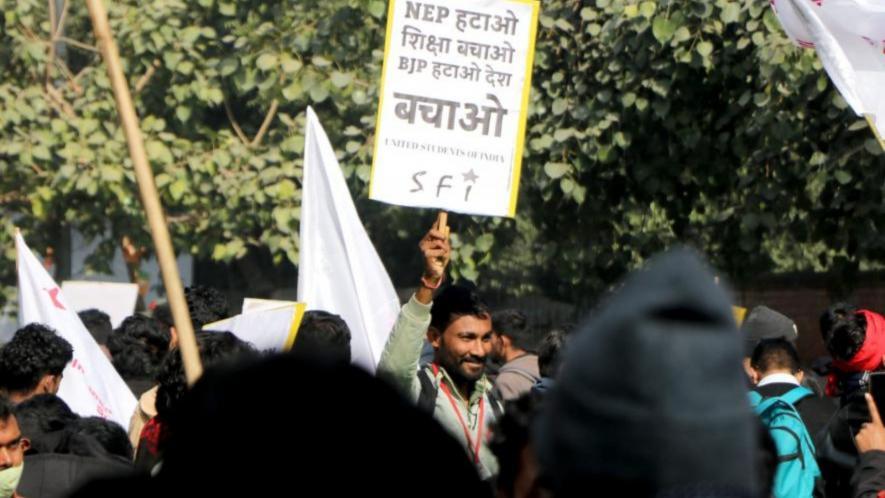10 Years of Modi: The Flickering Flame of Education

File Photo
New Delhi: When it came to power in 2014, the Narendra Modi-led National Democratic Alliance (NDA) had promised the moon in education – it had promised “equality of opportunity” with special focus on girls, “highest priority” to address the acute shortage of teachers and researchers, public spending of 6% of GDP, among other things.
In a decade of the Modi-led regime, the most proactive steps have been seen in the change in content of textbooks, especially history and political science to suit the narrative of Hindutva, leaving a gaping hole in access to education, especially for the marginalised sections.
To get an idea into the promises made by the Modi government and the reality on the ground in the field of education, an ‘Education Report Card – 2014-24’ has been brought out by Financial Accountability Network India (FAN-India), a collective of civil society organisations, unions, people’s movements and concerned citizens.
The report card noted that in accordance with the National Education Policy (NEP) 2020, the consolidation of government schools had surged in recent years, defeating the very purpose of the Right to Education Act.
“In 2023 alone, over 4000 schools were merged nationwide, affecting numerous children. Maharashtra announced the merger of schools, impacting around 2 lakh children, while Odisha shut down 7,478 schools. Additionally, Madhya Pradesh proposed merging 35,000 schools into 16,000 establishments. These actions, particularly in remote areas, raise concerns about education access and compliance with the Right to Education Act” it said.
Contrary to the Modi government’s promise of improving “access to education”, the reality is that “between 2018-19 and 2021-22, the total number of schools in India decreased by 61,885, dropping from 15,51,000 to 14,89,115. The most significant decline was observed in Central and State Government schools, accounting for 61,361 closures.”
The decrease in the number of government schools has been accompanies by a rise in the number of private schools, which makes accessibility a big question for the marginalised sections.
In 2014-15, there were 11, 07,118 government schools and 83,402 government-aided schools across the country. The number of these schools reduced to 10, 22, 386 and 82,480 in 2021-22, respectively. On the other side, the number of private schools was 2,88,164 in 2014-15, and rose to 3,35,844 in 2021-22, registering a rise of 47, 680.
Coming to the acute shortage of teachers, the FAN-India report cited a parliamentary standing committee report that said 10 lakh out sanctioned 62.71 lakh posts were lying vacant at the state level. This is very evident by the reports of various agitations by candidates who had applied and cleared exams for teacher jobs awaiting appointment letters in states, such as Uttar Pradesh, Bihar, West Bengal among others.
On the gross enrolment ratio (GER), the FAN-India report card found a decrease at all levels-- primary to higher secondary. The GER decreased 103.39 at the primary level to 57.56 at the higher secondary level, it noted.
The worst hit were the marginalised sections – the Scheduled Castes (SCs), Scheduled Tribes (STs) and the Other Backward Classes (OBCs) – and the minorities.
For SCs, the GER decreased from 113.1 at the primary level, 84.91 at the secondary level and 61.49 at the higher secondary level, while for STs, it was lower, with 106.5 at the primary level to 78.06 at the secondary-level and a mere 52.02 at the higher secondary level, the report card said.
“In 2022, the pre-matric scholarships for Classes 1-8 for STs, SCs, OBCs and religious minorities were discontinued for the academic year 2022-23,” it noted.
Worse still, there was discontinuation of various scholarships for these sections in higher education. For instance, in 2022, the Modi government halted the Maulana Azad National fellowships for minorities, that helped that attain higher education, such as M.Phil, PhD etc.
The ’Merit-cum-Means Scholarship for professional and technical courses also plunged from Rs 243 crore in 2013-14 to only Rs 33.80 crore in 2024-25, it says.
In a further comment on the sorry state of affairs in higher education, the report card cited a report on a government reply in the Lok Sabha, saying that 33% of all teaching positions were lying vacant in 45 Central universities, while 40% teaching posts in IITs and 31.6% in IIMs remain vacant.
Drilling holes into the Modi government’s promise to increase spending on education, the report card noted that the allocation for the Department of School Education and Literacy, as a share of the total budget outlay, almost halved from 3.16% in 2013-14 to just 1.53% in 2024-25.
“The allocations for the Department of Higher Education as a share of overall budget outlay decreased from 1.6% in 2013-14 to 1% in 2024-25,” it said.
Coming to the Modi government’s only proactive move in 10 years – saffronising of education – the FAN-India report card notes various changes in curriculum, such as deleting chapters and paragraphs on the role of Hindutva outfits in the assassination of Mahatma Gandhi, the subsequent ban of Rashtriya Swayamsevak Sangh, references to the Gujarat communal pogrom in 2002 from NCERT textbooks.
Recall that in 2023, as many as 33 academicians, in a letter addressed to NCERT Director Dinesh Saklani, who were part of the Textbook Development Committee, had demanded the removal of their names from the current textbooks. The move came just days after political scientists Yogendra Yadav and Suhas Palshikar dissociated themselves from the "rationalised" political science textbooks.
“Content related to the Mughal era and previous Muslim rulers of India has been significantly reduced. Three chapters outlining protests evolving into social movements in contemporary India including the Narmada Bachao Andolan have been removed from political science textbooks from 6 to 12. Passages on caste discrimination, writings by Dalit activists and poets, and topics pertaining to religious harmony were removed,” the report noted.
Recall that in 2023, as many as 33 academicians, in a letter addressed to NCERT Director Dinesh Saklani, who were part of the Textbook Development Committee, had demanded the removal of their names from the current textbooks. The move came just days after political scientists Yogendra Yadav and Suhas Palshikar dissociated themselves from the "rationalised" political science textbooks.
Get the latest reports & analysis with people's perspective on Protests, movements & deep analytical videos, discussions of the current affairs in your Telegram app. Subscribe to NewsClick's Telegram channel & get Real-Time updates on stories, as they get published on our website.
























